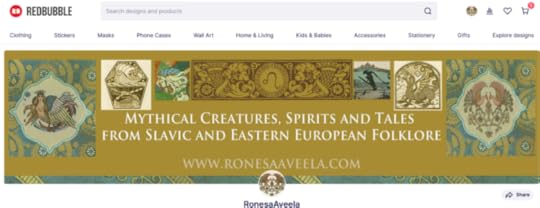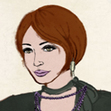Ronesa Aveela's Blog, page 11
March 24, 2021
Ivan Bilibin’s Magical Fairy-tale World
[image error]Renowned artist Ivan Bilibin lived in a magical world of fairy tales, filled with Slavic mythological creatures.
The scary face of his old “babushka – witch” in the middle of the dark woods flying in wooden vessel always scared me when I was a child. Vassilisa the Beautiful was one of my favorite fairytales. The book had colorful illustrations. Each of them was unique, and every time I read one I discovered more and more fascinating details and something extraordinary. Even though they come from the same artist, there’s something distinctive in them that will make anyone think that they may have been illustrated by different artists.
Every child in Eastern Europe and Russia has seen these illustrations of Ivan Bilibin (1876-1942), but many probably don’t know his name or his bio. If you grew up in Bulgaria and your parents read you fairytales, then Bilibin’s extraordinary illustrations of Baba Yaga, the Firebird, and Ivanushka are probably imprinted in your mind forever.
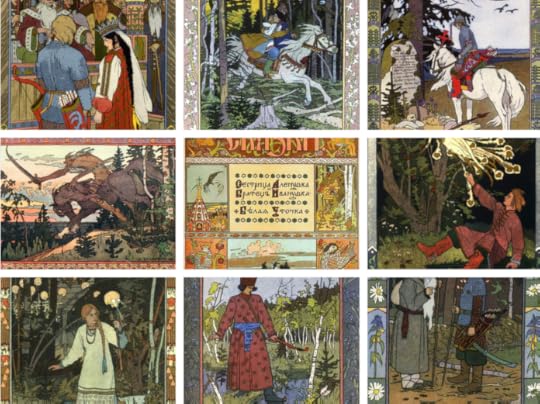
Even today, I’m still captivated by the colors, especially the blue is one I’ll always associate with these Russian illustrations. The control of line and form, and supporting border art makes for wonderful full page art. I feel very fortunate in having a set of his illustrated books, post cards printed in Moscow.
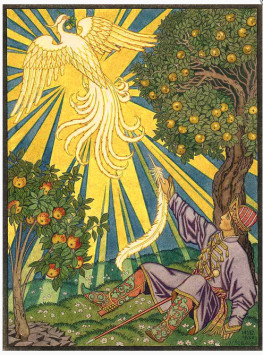 I’d like to share some information about him that you might not know.
I’d like to share some information about him that you might not know.
The artist was born in 1876 in the suburb of St. Petersburg as the son of a military doctor. After graduating in May 1900, he went to study in Munich, where he was trained by a few masters in Russian art. In 1899 he received a commission for designing a magazine for the Russian ‘World of Art’ artists’ association and soon became an active member.
Bilibin discovered his signature style while sojourning in the village of Yogna (400 kilometers from Moscow). There he a series of illustrations for Russian folk fairytales – Tsarevitch Ivan, the Firebird, and the Gray Wolf, which later defined his artistic style forever.
In 1899 he released his illustrations of the Russian fairy tales The Tale of Ivan the Tsar’s Son, The Firebird and the Grey Wolf, Vassilisa the Beautiful, and The Frog Princess. This gained him popularity. But his talent was in high demand beyond the publishing world. He was active in stage design for operas and ballets all over the world. In his career he also painted stage sets, for example for Ruslan and Ludmila or Nikolai Rimsky-Korkasovs The Golden Cockerel.
His life was fraught with challenges and after the October Revolution in 1917, Bilibin left Russia for a while. He moved to Egypt, where he earned his living by making frescos to decorate the homes of wealthy people, and he also studied ancient Egyptian art. The illustrations below demonstrate the influence of this period in his work.
[image error]
Finally in 1936, he returned to his home country, where he worked on illustrations for Tolstoy and mythology and history books. He died during the German Siege of Leningrad in 1942, starving within the city when he refused to leave.
Today, Bilibin is mostly remembered as an illustrator of fairytales, but the artist created sketches for novels, too. Bilibin’s sketch of Peter the Great is for Alexei Tolstoy’s novel by the same name.

Bilibin’s vivid imagination and talent are still inspiring artists and writers today.
I’ve used some of his designs and images in the Spirits & Creatures books and also in my Redbubble shop where you can find a variety of unique designs for T-shirts, stickers, and more inspired by his art and mythology and fairytales. It’s a place where you can rediscover the magic of his art and Slavic and Eastern European mythology, get a gift or something to treat yourself.
Source of Information: https://www.veranijveld.com/authors–illustrators/ivan-bilibin
March 12, 2021
Baba Yaga, Demon or Goddess?
In Bulgaria, March is a time for supernatural creatures to return to the human world from their winter residence in Dragon Village (Zmeykovo). Baba Yaga is one of the most well-known of these figures in Slavic folklore. “Baba” is a word that means “old woman” or “grandmother,” while “Yaga” comes from a word that possibly means “ill-tempered” or “quarrelsome,” as well as being derived from numerous other words, such as “illness,” “horror,” and “torment,” to name a few.
And she was indeed an ill-tempered old woman, and ugly, ugly, ugly. She has a crooked nose and iron teeth. The witch is skinny, with bones poking out.
If you haven’t heard about her, she’s a witch with a proclivity for eating children who wander onto her property. She lived in a hut that stands stilt-like on one or two chicken feet, and a fence of the bones of her victims surrounds her property. The witch doesn’t fly on a broom. Instead, you’ll see her in her mortar, using a pestle to guide her through the air.
Her hut, too, is a wonder to behold. It hops about, spinning, screeching, and moaning. When Baba Yaga wants it to stand still, she recites a special incantation.
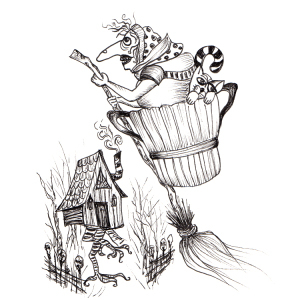
While doing research on dragons, I discovered Baba Yaga has been compared to Hala, called a storm demon in some locations. Wherever she travels, she stirs up the wind.
But, Baba Yaga was also once a goddess of birth and death, the guardian of the fountains of life and death. Like nature, she is wild and untamable. She is the image of the matron of the family, one who no longer has to care for her own children. These women were knowledgeable in folk healing, and were thought to possess the power of life and death.
Baba Yaga can determine a person’s fate and represents the darker side of this wisdom. If her guest performs special tasks, without complaining, the witch will give the person magical gifts to help them as they tackle other adventures. If they complain, or ask too many questions, their fate is to end up in the witch’s oven. Even though she is known for her wisdom, she ages one year for each question she’s asked, so, yes, that can certainly put a damper on her willingness to help.
As time went on, she eventually became the hideous creature whose main desire was to devour children, rather than help bring them into this world.
Baba Yaga is one of our favorite characters in our Dragon Village middle-grade fantasy series. We’ve also collected so much more information about this fascinating personality that we’ll share in a future book about Folklore Witches in our Spirits & Creatures series. For now, though, we’ll leave you with some artists renditions of this famous witch: https://www.picuki.com/profile/bulgarianfolktales.
February 12, 2021
Dragons, Wine, and Love
Did you know that people once believed (and may still believe) that comets streaking across the sky were dragons? It could be a dragon hurrying to visit his beloved. He flies down through the fireplace chimney before he changes into human form to meet her. Since February is the month for love, if you see a comet in the sky, maybe it’s a dragon heading to visit his loved one.
You may wonder what connects dragons, wine, and love. The answer lies within the traits of the dragon zmey. Belief in the zmey was, and perhaps still is in some areas, the most widespread across Eastern Europe.
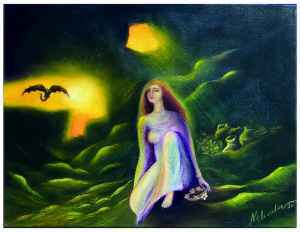
In appearance, the zmey can be your typical dragon, or a beastly combination of man and snake. But, he’s also a shape-shifter and so he may appear in a variety of forms: animal, human, and natural phenomenon, among the most common. He may also become an eagle, especially when he’s battling storm-bringing dragons (like the hala or the lamia). One form he takes I found rather amusing was that he could become a “shiny white chicken” strutting around the yard. He can also change into different types of vegetation and inanimate objects. That’s to say, he could be just about anywhere!
Most often, however, you’ll see the zmey as a handsome youth. His hypnotizing eyes, a body that may glow, and small wings beneath his arms distinguish him from other men. He’s also highly intelligent, has super strength, and many other abilities. He’s like the Superman of mythical creatures.
Although we portray him as a unique character in our Dragon Village stories (more of those coming soon), in most countries, the zmey is a species of dragon: male, mostly benevolent (depending on the location), and the wielder of multiple roles: he controls the weather, protects his chosen village, but most importantly, he’s a passionate lover.
The zmey has a discerning palate. His drink preference is wine, but it must be squeezed from the largest, ripest, sweetest, and blackest grapes. He likes it formally presented to him wrapped in a towel. To go along with that, you must serve him the best white bread, made from only the purest grains, which have been sifted with the smallest sieve.
Not only is he a connoisseur of wine and bread, he’s particular about his choice of females. Even though the zmey can select a bride from among female dragons of his species, he finds it difficult to suppress his cravings for human girls. The zmey’s chosen bride is often the most beautiful girl, the first to begin dancing the horo (circle dance) at village gatherings. She’s not only beautiful, she’s also personable, outgoing, and hardworking.
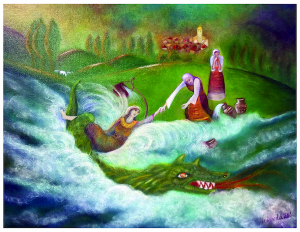
Don’t go and hide your daughters! You’re safe at the moment, because it’s only during the warmest months that he steals girls from their families, especially on Eniovden, the summer solstice (June 24), and during the harvest on Georgiovden, St. George’s Day (May 6), when girls have gathered in the field. He likes it when they’re all together. It makes it easier for him to decide which one he likes the best. He may not always kidnap her. He may first woe her with promises of wealth.
When the dragon has found the girl of his dreams, he may not win her over right away. He’ll often visit her at her home to persuade her to go away with him. I’ve often wondered if he brings her roses in his nightly visits. Perhaps not, since he himself can turn into flowers.
Once he has his intended bride, be prepared for a spectacular wedding, with as much pomp and circumstance as a royal wedding. Unfortunately, only the bride-to-be can see the arriving procession. Whirlwinds. Fire. Thunder. White horses. Golden chariots. The groom tells the girl to be ready for the wedding party. Washed, clothed in ornamented wedding attire, hair braided according to customs, she waits in the yard for him to come in the night to whisk her away. With tears in her eyes, she turns and says a final “goodbye” to her mother, for she may never see her again.
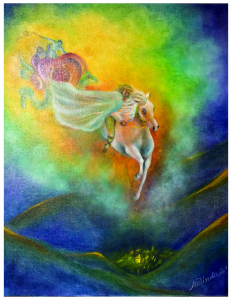
The zmey and his love have a darker side. Once he loves a girl, she has little choice in avoiding his attention. People believe she can’t escape her fate. The zmey is an obsessive, controlling, jealous lover. He possesses the girl’s consciousness until he’s all she can think about.
There’s a Bulgarian saying that describes this: It’s as if dragons love her. She hides, withers, loses weight, and fades.
Held captive by his love, the girl pines away, avoiding social gatherings, especially the dances she once loved so much. She’s quiet, sad, and depressed; she often cries or mumbles; and she suffers from hallucinations. Her skin becomes dry, pale or colorless, and withered. She has sunken cheeks and watery eyes. Once loved by a zmey, the girl will never find satisfaction with a human lover—if the zmey even allows her to find one.
 As you see, the zmey is an interesting, multi-layered creature. You can learn so much more about him and other dragons in our book A Study of Dragons of Eastern Europe: https://books2read.com/dragons-aveela.
As you see, the zmey is an interesting, multi-layered creature. You can learn so much more about him and other dragons in our book A Study of Dragons of Eastern Europe: https://books2read.com/dragons-aveela.
 You can also discover some dragon fairy tales in our book Dragon Tales from Eastern Europe: https://books2read.com/dragon-tales. Both are available wherever you buy ebooks and print books.
You can also discover some dragon fairy tales in our book Dragon Tales from Eastern Europe: https://books2read.com/dragon-tales. Both are available wherever you buy ebooks and print books.
January 15, 2021
Kukeri to Chase away Corona
The world’s gone crazy, it seems. These days, it’ll be a difficult task to repair the rift that divides our land. In times of old, people would call on the kukeri (or survakari) to chase away the evil spirits causing such discord. We’ve written about this group in the past on our blog, but this seems an appropriate time to resurrect the topic.
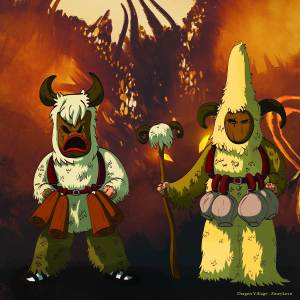 Bulgarian Kukeri. Masked men, who chase away evil spirits away, during the Bulgarian custom “Surva.”
Bulgarian Kukeri. Masked men, who chase away evil spirits away, during the Bulgarian custom “Surva.”Kukeri are fascinating, so much so that we’ve included them in our fiction and non-fiction books alike. But what are these beings? Are they human or creature?
In today’s culture, they’re merely men (with women becoming more involved as the years go by). In the past, however, they were something more. The participants had magical powers. They were Thracian warriors who dressed in animal skins in order to battle with evil spirits. If the kukeri won the contest, they’d frighten away the evil ones and capture their power. This power and right to perform the rituals were passed down from father to son in many villages.
The celebration occurs at different times in various parts of Bulgaria and other Eastern European countries. It’s both a winter and a springtime festival to restore order and prosperity in the land. The kukeri celebration is one of the oldest surviving traditions that can be traced back to Dionysian rites, symbolizing life, death, and rebirth. Men initiated rituals when spirits threatened the Sun’s rebirth during the winter solstice.
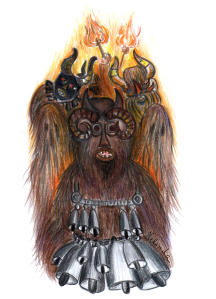
The kukeri continued the practices into the spring, before the sowing of the harvest, when the earth was awakening after a long winter. The kukeri performed rituals to renew nature’s strength. They’d harness nature’s reviving energy so fields could become fertile. The men would demonstrate their own ability to produce offspring. The belief was that only men, who carried the seed of life in their bodies, had the ability to rouse and nurture the female Mother Earth.
Today, the celebration is mostly for fun. It’s festive, noisy, and somewhat frightful. The kukeri dress in furry costumes like wild animals and wear colorful, wooden masks with scary faces, mostly of rams, goats, or bulls. The participants parade through the village; they jump and yell, perform skits about plowing and sowing seeds, and pantomime political and other popular figures. As they move in special rhythmic steps, giant bells around their waists clang loudly.
You can see some of the various costumes the kukeri wear across Bulgaria in this short video: https://www.youtube.com/watch?v=SWIK0SfT4Mw.
Can their bells still work their charms in this day and age? A group in Bulgaria recently performed the dance to chase away the corona virus. You can read the full article here: https://bnr.bg/en/post/101404060/survakari-will-chase-away-the-coronavirus-in-villages-near-bulgarias-pernik.
December 14, 2020
From My Window
Our nation has just celebrated Thanksgiving. The brave took to the road, tired of being apart from loved ones and confused by the information from our leaders and others. Now everyone is saying this Christmas will be different. As I look back over the past nine months, I wonder how we can make this “different” better.
Since we moved to Virginia, I’ve been working from home. My day starts around 6 a.m., sometimes earlier. In the summer, the sun was already up, shining over my red roses. I sip my coffee and start my work day, with meeting after meeting. We are busy but everyone used to be cheerful.
Across the street at a day care, cars used to arrive one after another, dropping off little children dressed in colorful clothes. They were like little chicks running around: some laughing from excitement, others screaming, unhappy to be apart from their mothers. The noise bubbled over until 8 a.m. before everything returned to normal—quiet. Later, around 5 p.m., the street would return to life as people got out of work and parents returned for their kids. This time all the children were excited: some ran toward their moms with pictures in hand, others with crafts.
Since March, the scene is different. I see no one riding on the school bus.The street is still and eerie. My morning is missing the colorful flock of chicks, their giggles and screaming. The cars are getting dusty in everyone’s driveways. We go quickly to get food and return to our “ship,” our safe harbor. People turn on the TV to see some light, some hope, but the news makes us feel even worse. We worry about family, friends, our jobs. Everyone is getting tired, too tired at times to even keep worrying.
On the other hand, I’m happy I can work from home. It’s a privilege and I’m grateful. I feel the tension at work as we’ve had a few rounds of layoffs and more are on the horizon, but we still are supporting each other.
The bad, the pain, has forced us to slow down and think about the important things in life. Will Christmas be different this year? Yes, definitely. But its intent can be the same if we keep the main reason behind it alive. Now more than ever we need to take care for those in need and share what we have. Some remain prosperous, others have less, but I think we can all share something of ourselves. We can buy fewer non-essential goods that only end up piled up in our closets. We can make donations to people in need and make their Christmas brighter. Check on your neighbor. Maybe they lost their job and can use some extra cash to get food or pay their rent or other bills. After all, sharing and love are the true meanings of Christmas.
To cheer friends and followers, I recorded one of my stories, The Christmas Thief, in English and Bulgarian. You can listen to them on YouTube.
English: https://youtu.be/NaphVVd7KgQ
Bulgarian: https://youtu.be/4BtBA7_JoPE
Let’s bring calmness to our busy, stressful days and see the lights of the season. Sit next to the fire, relax, and enjoy.
I’m confident next year will be better. The kids can return to school, play sports, and have birthday parties. We can go to movies and games and have a huge bucket of popcorn or a hotdog. We need to believe!
Christmas Books
Here are a few Christmas books from author friends of ours. We hope you find something to make the season merry. Health and Blessings to everyone.
eMagazines

Mom’s Favorite Reads eMagazine December 2020: https://books2read.com/u/4EPpV0

Mom’s Favorite Reads eMagazine December 2018: https://books2read.com/u/4DgDM7
Short Story
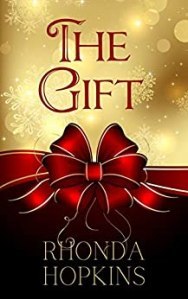
The Gift by Rhonda Hopkins: https://books2read.com/u/bprYvg
Children’s Stories
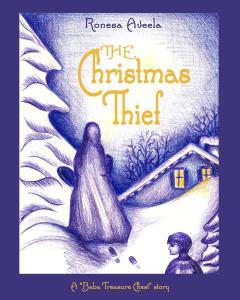
The Christmas Thief by Ronesa Aveela:
https://books2read.com/Christmas-Thief
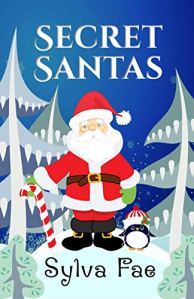
Secret Santas by Sylva Fae: https://books2read.com/u/4XLepv

Children’ Christmas Collections:
(boxed set of all 4 ebooks): https://books2read.com/u/3yzQAn
(paperbacks): https://www.amazon.com/dp/1670783774/
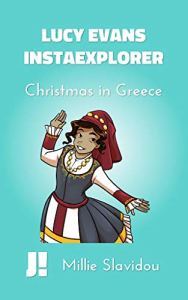
Christmas in Greece by Millie Slavidou: https://books2read.com/u/4NXez6
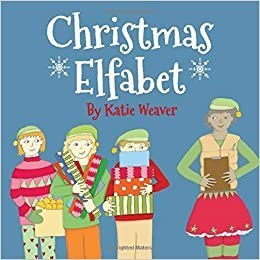
Christmas Elfabet by Katie Weaver: https://books2read.com/u/baaqeQ
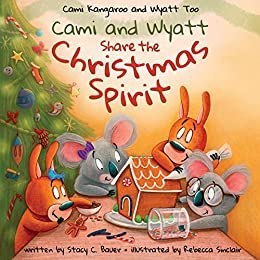
Cami and Wyatt Share the Christmas Spirit by Stacy Bauer: https://books2read.com/u/b6KGN6
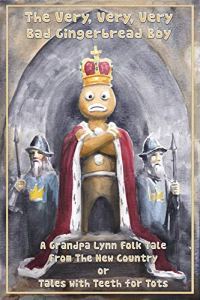
The Very, Very, Very Bad Gingerbread Boy by Cusper Lynn: https://books2read.com/u/mKyVnZ
Romance

Mary & Bright by Katherine E. Hamilton: https://books2read.com/u/mBGDQy
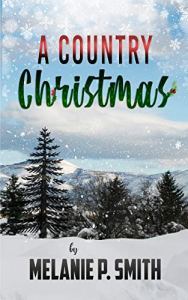
A Country Christmas by Melanie P. Smith: https://books2read.com/u/4XLER9
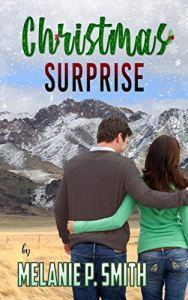
Christmas Surprise by Melanie P. Smith: https://books2read.com/ChristmasSurprise2
Crafts

Christmas Crafting with Lacey by Lacey Lane: https://books2read.com/u/mYAqwP

More Christmas Crafting with Lacey by Lacey Lane: https://books2read.com/u/bQde8Z
Adult Humor / Graphic Novels
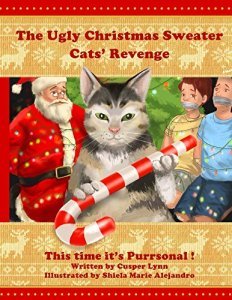
The Ugly Christmas Sweater Cats’ Revenge by Cusper Lynn: https://books2read.com/u/bWP6Xz
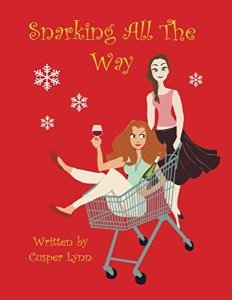
Snarking All The Way by Cusper Lynn: https://books2read.com/u/3kABRG
December 11, 2020
Nobody Can Drink from an Empty Cup
We are all experiencing anxiety and fear these days. It’s to be expected as we’re seeing our world and lives change. A crisis like this is too complex to put into words. In times of human struggle, the world needs kindness and empathy.
Can you push through your anxiety and find blessings in these challenges?
I’ve learned a lot about myself in 2020. One thing is that I shouldn’t take for granted the little things in life.
Like many of us, this year has made me look at my life and see what’s most valuable. What I’m thankful for. I think it’s a simple but hard question for many: what do you value most? For me, my family and my health are the most important. My family, because I love them dearly. My health, because as my baba use to say, “Nobody can drink from an empty cup.”

Christmas has a special place in my heart. While I was growing up, Christmas was forbidden in Bulgaria by the Communist party. We only celebrated New Year’s, but my grandmother was always able to keep the Christmas spirit and traditions alive. In this post, I’ll introduce you to one of my favorite rituals, “fortune bread.” I weave rituals and traditions from my childhood into all my books, to keep them alive and pass them on to future generations.
December is magical in Bulgaria. The harvesting is done, wheat is in the mills, wine is ready for drinking. It’s a time to stay near the fire, cook hearty meals, and celebrate with family and friends.
The beginning of the winter festivities starts in late October and continues until early spring when nature awakens and people need to go back to the fields and vineyards. This is the time when name days abound. These are special days dedicated to a person’s name, and are an important part of the celebrations. For Bulgarians, name days are even more important than birthdays.
One major celebration is St. Nicholas day, Nikulden, on December 6. Everyone who has a name related to “Nicholas,” whether male or female, celebrates this name day.
The saint is not only the patron of the seas, sailors, and fishermen, but also a patron of merchants and bankers. According to beliefs, he helps young people to get married. On his day, people prepare a meal of ritual bread, baked carp, and wine.
For me, Nikulden is the start of the Christmas preparation and celebration. Christmas Eve, or as we call it Budni Vecher, is one of the most beloved and cozy family holidays. People from near and far return to their families to celebrate Christmas and wish all the best for the coming year. On Christmas Eve, we perform rituals and traditions that have been observed in Bulgarian families for centuries.
Before setting the festive table on Christmas Eve, the owner of the house lights a special tree in the hearth, called a budnik. The wood is pear, oak, or beech. I created a new tradition in my family by keeping the trunk from our Christmas tree and using it as a budnik log for the next year. It feels like the tree carries the magic of Christmas and our memories.
The meal is an essential part of the evening. The dishes on the table are an odd number and are healthy. Seven is popular because it’s signifies the number of days in a week, and people make a variety of nine dishes because nine represents the number of months of a woman’s pregnancy. In some parts of the country, they make twelve dishes, as many as the months of the year, but I guess they like to cook.
I don’t have enough time for that. I usually do only seven dishes, because it takes time to cook everything from scratch, and nowadays we work full-time jobs and juggle other household tasks. Besides, seven is my favorite number.
Honey is a must have on the table to make sure the new year is sweet and prosperous. I like to include walnuts, because we do fortune telling using walnuts. Each person selects a walnut and if the nut is good inside your year will be healthy and happy.
But my favorite ritual as a child and even now is the fortune bread called pitka. It’s always home-made, as it’s a symbolic sacrifice. We put a coin wrapped in foil inside the dough. Whoever gets the coin in his piece of bread will be the lucky one during the year.
Christmas is a special time for many people. The holiday can be chaotic and has become one of the most commercialized days of the year. Yet, still, it’s a holy day for many people, despite the fact that the stresses of the season take over. We talk about this holiday in our book Light Love Rituals. You can also learn a little more about Budni vecher in our children’s short story The Christmas Thief, where a little boy learns about sharing.
If you want to make this ritual bread yourself, you can download the recipe here: https://storyoriginapp.com/directdownloads/b5a2b185-261d-4837-b1cb-54ec785cd618.
Wishing you a blessed and happy Christmas and holiday season. Stay safe and happy!
October 26, 2020
A World Filled with Beauty and Love – The Art of Plamen Dinkov
Today, October 26, is St. Demetrius’ Day. This saint was often said to be the twin of St. George, the mighty dragon slayer. He’s the protector of winter and cold, and the patron saint of soldiers and the crusades. His holiday marks the end of the farming season. Our guest today, Plamen Dinkov, carves images of this saint, along with many other holy images.
~~~
Did you know trees have souls and hearts? If you doubt it, take a look at Plamen Dinkov’s art to verify it for yourself. With his talented hands, he turns every piece of wood into a fairy tale, a prayer, a confession of love. His works help me dive into a world without pain and anger, where beauty and harmony reign.
[image error]
His masterpieces are born from the roots, Bulgarian folklore, the traditional Bulgarian school of woodcarving. In his work, you’ll find scenes from Orthodox churches, icons, St. George and his fight with the dragon, and many other legends and magical tales. Bulgarian mythology is an endless topic of inspiration for artists and writers alike.
[image error]
I asked Plamen to write something about himself to help me present it to my fans. I share his words and creative path and help you know him better.
[image error]
“I was born in 1957 in Blagoevgrad, and I spent my childhood and school years in Vratsa, where my love for art and woodcarving was born for the first time. I live and work in Sofia. Initially, I was also involved in metal plastics and artistic processing of metal in the Association of Masters of Folk and Artistic Crafts, but slowly woodcarving pushed everything aside. For 40 years I have been doing what I love the most. I learned everything in carving on my own, without any help. I even made my first tools myself. It was not easy, I had to discover the intricacies of the craft on the go, but it brought me great satisfaction and maybe gave me the opportunity to build my own style … The artist works for the audience, but the great thrill, love, intoxication for me is before, in the sleepless nights when the next work is born in your mind and in the days when it slowly comes out of your hands. My art has been bought and is available all over the world – Italy, Greece, France, Spain, Germany, Russia, America, etc. I am proud, of course, of my woodcarving crosses purchased and donated during the visits of Pope John Paul II and King Juan Carlos of Spain to Bulgaria in 2002 and 2003. Most of my works, though, are here in Bulgaria, in private collections and homes. I have notebooks and notebooks full of ideas for new things. There are a lot of ideas – there is so little time. If God said so, I would fulfill as many of them as I could … Finally, a question that a person often asks himself: Was he happy? Yes, I am a happy, extremely happy person! I do what I love and live in my world full of beauty and love!”
[image error]
To follow Plamen Dinkov, you can like his FB page:
https://facebook.com/PLAMEN-DINKOV-WOODCARVING-345970847843/
Or his website: http://dinkovwoodcarving.com
October 9, 2020
Here Be Dragons
No one has been able to “prove” the existence of dragons, but in the hearts and minds of the people, they did exist at one time. I’d like to share with you excerpts from the Dragon book that will be available soon. We’re aiming for November 2020.
People believe dragons have created various structures. Some of the most common are dolmens, chambers formed by large stone blocks. These chambers are found throughout Europe in mountainous regions, with sheer cliffs that hide a cave. Some date back 7,000 years, while most are thought to be from the early Neolithic age (around 4000–3000 BC). In folk belief, they’re called dragon houses, and are said to be proof dragons existed, although archaeologists say they are likely to have been burial chambers.
[image error]Source: Photo by Stankow, 13 September 2013. Creative Commons License: https://creativecommons.org/licenses/by-sa/4.0/legalcode
Other dragon tales tell how geographical sites came into being: rivers, lakes, mountains, and more. Springs at the bottom of a cave or a rock are often said to be tears of a kidnapped girl. Here are a few places people once believed dragons created.
Great Stones of Khlyabovo Ridge: A long time ago in Khlyabovo, Bulgaria, a dragon protected the villagers. In return, the people provided him with animals from their flocks. Some men rebelled, saying they would no longer feed the dragon. And so, the dragon abducted and ate villagers. One boy, Katos, fought with the dragon all day, finally wounding it. When the dragon fell from the sky, it petrified and formed huge stones. Even today, local people say they see flames, the fire of the dragon, coming out of the rocks.
Serpent’s Wall or Dragon’s Rampart: According to folklore, long, tall embankments in parts of Ukraine came into being when a hero tricked a dragon into dividing the land between them. The hero harnessed a plow to the dragon, and the dragon pulled and pulled, mile after mile, deeper and deeper, creating the ever-growing embankments. The hero didn’t cease urging the dragon onward until the creature died of exhaustion. A more historical purpose of the embankments was as a defense mechanism against invaders, with the dragons being symbolic of foreigners.
Balaur Hill: This hill, named after a Romanian dragon, arose when a gigantic balaur fell from the sky and died. A single rib measured 22 inches (56 centimeters) in width. His body slowly rotted over a long period of time, forming a great mound.
Margarets Hill and Latin Well: A Bulgarian story talks about how a Latin man and his daughter Margarita cultivated a vineyard on a hill, which was near a well that dragons and fairies came out of. Near the well, the father built a cellar to store his wine. A young man courted Margarita in the vineyard, but one day a whirlwind arose and a black cloud covered the hill. The young man, who was a zmey, embraced her and flew into the cloud and headed toward the well. As the cloud descended, lightning crackled, and the two young people sank into the well, never to be seen again. The hill and well were named after the girl and her father. Even today, people will tell you, if you part the bushes and grass on the hill you can see the ruins of the basement by the well. At night, no one goes near, because it’s still a zmey’s haunt.
The story below relates how a hot spring gained its name.
Many, many years ago, an old zmey ruled the forests between Struma and Mesta [rivers in Southwest Bulgaria]. He had two sons, and they were zmeys, which he sent here and there for work.
“And what was the work of the zmeys, Grandpa Marin?” the curious asks.
“Their job,” he explains, “was to arrange the clouds, to spread rain, hail, thunder, and lightning.”
Once the smaller zmey was flying over the village of Mosomishte. It was Easter, so all the people were at the horo, and among them was the priest’s daughter, the beautiful maiden Toplitsa. The zmey saw her from the clouds, liked her, and then came down and grabbed her from the horo before anyone knew what was happening. The poor father asked and searched everywhere, but didn’t find any trace of her. A long time passed and her parents stopped thinking about her.
One summer day, the priest climbed St. George’s Rock to gather wood for fire. It felt like something was pulling him higher and higher, until suddenly he saw his daughter, all in golden clothes and adorned with coins. They hugged each other in tears and the girl said that the young zmey had grabbed her, but her father got angry and drove them away from Alibotush mountain, where his palace was. Now the two lived on St. George’s Rock. The zmey’s bride was afraid that her husband would meet the uninvited guest, so she quickly sent her father away, but she wanted to give him a farewell gift. She filled up a sack of coins, but since she had already learned some zmey magic, she made the gold light as a feather so that it would not weigh on her father on the way.
She told him to open it when he got home. They said goodbye and Grandpa Priest left with the sack on his shoulder, but something kept irritating him to see what was inside. In the end he couldn’t stand it, he opened it and what did he see? The sack was full of onion peels! He got angry, poured out the peels, then took the sack and went home without wood. He decided to shake the sack one more time and what did he see? One coin was stuck inside.
The priest told everything to his wife and she scolded him and ordered him to go back immediately and to bring the onion peels, which were enchanted coins. The priest hurried, climbed back, but it was too late. Right in place of the peels, a large river of hot water gushed out and dragged everything down. When the priest shook the sack, his daughter saw him from the rock and got very scared that the zmey would see and get angry. She began to pray to God for help, and he heard her prayers and made the hot water gush out and take away the onion peels. Since then, they named the river Toplitsa after the priest’s daughter.
According to the legend, its warm water gradually cools and when it becomes really cold, the river will dry up.
Source: PIC. “ЛЕГЕНДИТЕ СА ЖИВИ! Николина от село Пирин била последната любов на Змея Горяни.” (“LEGENDS ARE ALIVE! Nikolina from the village of Pirin was the last love of Snake Goryani.”) May 9, 2017. https://pik.bg/легендите-са-живи-николина-от-село-пирин-била-последната-любов-на-змея-горянин-news655961.html.
Another interesting tale I discovered while doing research is not from Eastern Europe, but it has many of the same types of characteristics as those stories.
In his “League of the Ho-de’-no-sau-nee, or Iroquois,” originally published in 1851, Lewis Henry Morgan (1954: 149 ff.) described a Seneca legend about the “homed serpent.” He-no, an assistant of the Great Spirit responsible for the formation of clouds and rain, and a keeper of the thunderbolts, was a guarantor of fertility. In one account he made his abode in a cave behind Niagara Falls. A young woman at a village at the mouth of Cayuga creek above the falls was betrothed to a disagreeable old man, and to escape her fate she put herself in a bark canoe and released herself on the current to plunge to her death and freedom. On her descent over the falls, however, she was caught by He-no, taken to his cavernous home and married to one of his helpers.
Before this event the people of her village has been plagued by a mysterious pestilence, and He-no now revealed to her the cause: a gigantic water serpent dwelt under her village on Cayuga Creek, poisoning the waters and feeding on the bodies of the dead buried there. He told her to advise her people to move to a new location, which they did.
The serpent, losing its source of sustenance, emerged from the earth to find the cause, and entered the lake to follow the people to their new home. While swimming in the channel of Buffalo Creek, the monster was spotted by He-no, who struck it with a thunderbolt. As Morgan (1954: 160) puts it: “The Senecas yet point to a place in the creek where the banks are semicircular on either side, as the spot where the serpent, after he was struck, turning to escape into the deep waters of the lake, shoved out the banks on either side. . . . The huge body of the serpent floated down the stream, and lodged upon the verge of the cataract, stretching nearly across the river. A part of the body arched backwards near the northern shore in a semicircle. The raging waters thus dammed up by the body broke through the rocks behind; and thus the whole verge of the fall upon which the body rested was precipitated with it into the abyss beneath. In this manner, says the legend, was formed the Horse-Shoe fall.”
Source: Blust, Robert. “The Origin of Dragons.” Anthropos 95, no. 2 (2000): 519-36. Accessed September 20, 2020. http://www.jstor.org/stable/40465957.
September 21, 2020
Diversity Is a Fact – Inclusion Is a Choice
Diversity is a fact; inclusion is a choice! In the last few years, we’ve all heard the word “diversity” used on TV, in newspapers, and during work training sessions. For a lot of people, diversity is about a person’s skin color, but the subject goes well beyond color.
Diversity means understanding that each individual is unique, and recognizing our differences, whether they are race, ethnicity, gender, sexual orientation, socio-economic status, age, physical abilities, religious beliefs, political beliefs, or other ideologies. When we’re open to diversity, we see people from different angles and accept them as equal to us.
Whenever anyone asks me where I’m from, I tell them and then ask the same question in return, because everyone has come from somewhere in the last twenty years, or fifty, or a hundred. America is a melting pot, but all these newcomers, immigrants like me and others, bring to this country new ideas, passion, creativity, and a desire to succeed and build their dream. This is the steam moving the engine and making this country great. Diversity is power, but you need to know how to nourish individual cultures to drive innovation, passion, and inclusion.
Love is natural; hate is learned. A child hugs and kisses another person long before he learns to hit and hurt. Yet as we grow, we become aware of all the hatred that fills this world—hatred toward those we know little to nothing about, simply because they have different beliefs, religions, skin color, or any other aspect that makes them not like us. But we are humans. We are all the same. What makes us different is due to where we grew up, what we were taught.
Each person is a constant project: changing and adapting—sometimes for the better, sometimes for the worse. All our lives we wander to find a better place to live or a better job, to learn new skills, to make a discovery, or to invent something of value. Today, technology has removed boundaries. We can easily physically travel to different places in the world, but we can also “bounce” around the virtual space of the web, where we make acquaintances worldwide.
In our travels, we build our homes, make new friends, raise our children, attend weddings, and say goodbye to friends and family, sending them to the world beyond. Even thousands of miles from where we were born and raised, we keep our customs and practice the traditions that we have been nourished with. We share them with friends who have a different cultural heritage, upbringing, and faith; and we in turn accept new ones.
We must learn to respect other cultures as much as we support people in our own community. Traditions are a great way to teach children the cultural and religious history of mankind by giving them their own identity and roots. Culture is a temple for the human soul. This is what we carry with us as we wander, what we develop as we adapt to the place we choose to call our home.
In my book “The Wanderer – A Tear and A Smile,” I reflect on my life as an immigrant, the appreciation of my Bulgarian culture and the culture of my adopted country, America.
Pick up a copy of The Wanderer – A Tear and A Smile: Reflections of an Immigrant for more insight into Bulgarian faith, folklore, and rituals.
[image error]
The book is available here: https://books2read.com/TheWanderer
Also available in Bulgarian: Българска версия “Скитникът – Усмивки и Сълзи” (Skitnikut – usmivki I sulzi: Rasmisleniata na edin bulgarski emigrant)
[image error]
Amazon: https://www.amazon.com/gp/product/1949397963/
Barnes & Noble: https://www.barnesandnoble.com/w/skitnikut-usmivki-i-sulzi-ronesa-aveela/1135608799?ean=9781949397963
Other retailers: https://books2read.com/TheWandererBulgarian
September 11, 2020
Hope and Miracles
September is here. We’ve had many sunny days this summer where I live in Virginia, but now the sunrise is coming a little later each day, and the nights are getting cooler. I find myself thinking about what changes autumn will bring in this unusual year. I want summer to go on a little bit longer, so I can savor the sun, the sand, and the sea. I want to linger in that lazy feeling of endless summer.
My grandmother used to say that when there is an “R” in the name of the month, it means that it is one of the cold months. We will have to wait until May to enjoy the warm rays of the sun. Maybe this is normally true, but this September has been like a summer month, with temperatures 20 degrees above normal.
On September 14, Bulgarians and other Orthodox Christians celebrate the Day of the Cross. On this day, a special festive table is arranged and a strict fast is observed. The apples have ripened, the grapes are plump and sweet, and the harvest has begun. However, it is forbidden to eat red foods such as apples, peppers, tomatoes, and others as an expression of respect for the cross on which Jesus shed His blood to save mankind.
The oldest woman in the house prepares ritual bread, called Cross Pitka (round homemade bread) for the holiday. She shapes a large cross on the bread before she bakes it. Its ingredients include half a kilogram of flour, half a teaspoon of honey, half a teaspoon of baking soda, half a tablespoon of vinegar, and water for kneading. According to tradition, you have to sift the flour three times before kneading the dough. The ritual bread is broken when the whole family gathers around the table. The bread will rise only a little while it’s baking, so you should eat it while it’s warm. Once it cools, it’ll become hard.
The Day of the Cross is considered the day on which autumn begins. Therefore, typical autumn foods like grapes (any but red ones) and tikvenik (a pumpkin banitsa) must be present at the table. (You can find a recipe and more info about tikvenik here.)
After families pluck the first grapes of the season, they bring them to the church, so the priest can consecrate the fruit. It’s also customary on this day for people to give each other grapes, so the next year will be bountiful.
On the Day of the Cross, thousands of pilgrims go to churches, monasteries, and other holy places to pray for health, forgiveness, and miraculous cures. One of these places of hope is the Cross Forest, located in the beautiful area in the Middle Rhodope Mountains. This was the birth place of Orpheus, the famous musician from ancient mythology. One of the most magical places in Bulgaria, Cross Forest gives you a sense you’re touching the mystery of nature.
[image error]
The Forest of the Cross is said to be filled with unexplained, extraordinary power that can cure any sickness. The magical powers are at their peak on the evening of September 13, the night before the Day of the Cross. People believe the heavens will open, and Jesus will descend to Earth to grant the wishes and cure the illnesses of those who offer prayers with true faith. Many stories tell how people with cancer and other incurable diseases miraculously found a cure. They say the water cures skin diseases and helps women conceive.
Unfortunately, I’ve never visited the place myself, but my grandmother told me many interesting stories. According to legends, part of the cross on which Jesus was crucified is hidden in this place, but no one knows its exact location. Monks hid it after Turks attacked and burned the monastery.
People also believe the extraordinary healing energy of Cross Forest comes from an ancient sanctuary to Dionysius, which is said to be hidden somewhere in the forest. But the Rhodope Mountains keep their secrets.
Miracles happen there, but people must have faith. Magic or not, in these challenging days, we all need to find our own Cross Forest. We need strong faith and believe in something to keep us going, so we can stay positive as we search for cures, happiness, and personal fulfillment.
[image error]
Pick up a copy of The Wanderer – A Tear and A Smile: Reflections of an Immigrant for more insight into Bulgarian faith.

